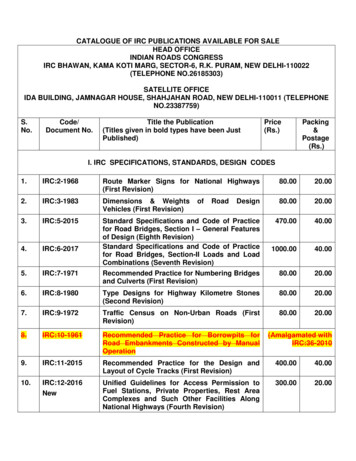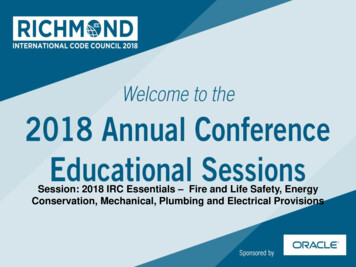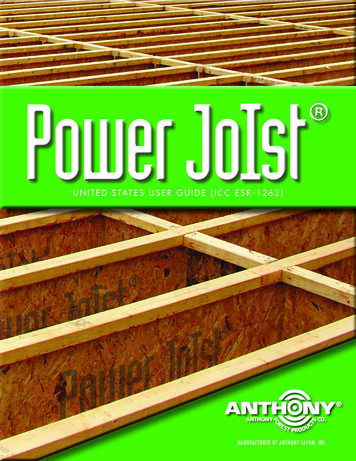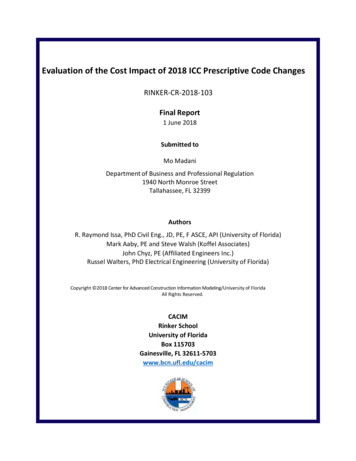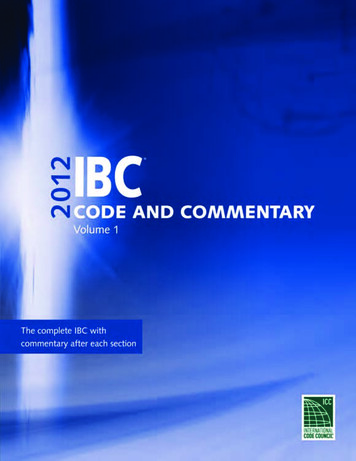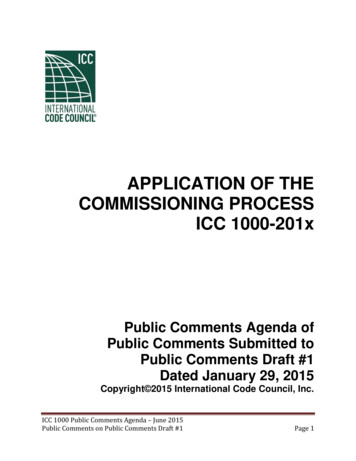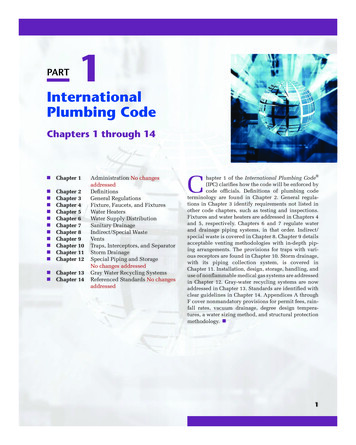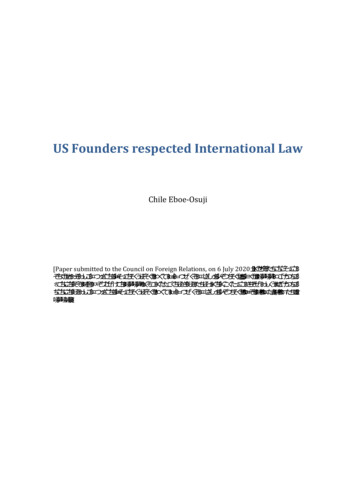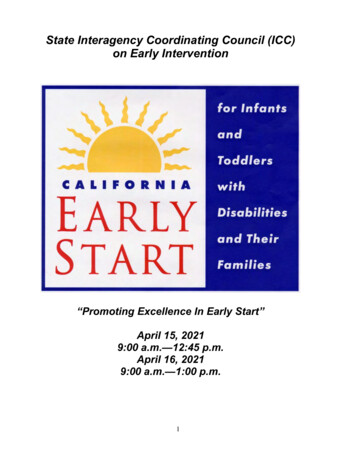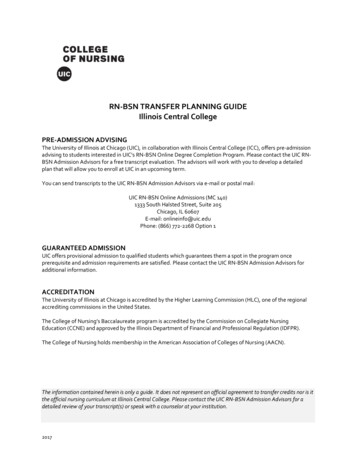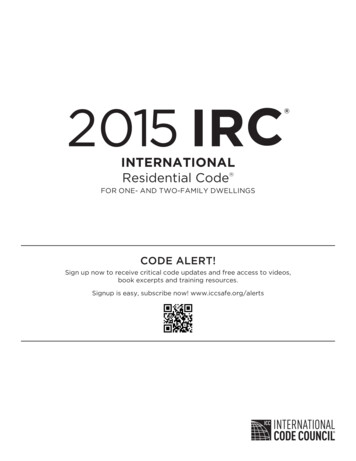
Transcription
2015 IRC INTERNATIONALResidential Code FOR ONE- AND TWO-FAMILY DWELLINGSCODE ALERT!Sign up now to receive critical code updates and free access to videos,book excerpts and training resources.Signup is easy, subscribe now! www.iccsafe.org/alerts
2015 International Residential Code First Printing: May 2014ISBN: 978-1-60983-470-8 (soft-cover edition)ISBN: 978-1-60983-469-2 (loose-leaf edition)COPYRIGHT 2014byINTERNATIONAL CODE COUNCIL, INC.Date of First Publication: May 30, 2014ALL RIGHTS RESERVED. This 2015 International Residential Code is a copyrighted work owned by the International CodeCouncil, Inc. Without advance written permission from the copyright owner, no part of this book may be reproduced, distributedor transmitted in any form or by any means, including, without limitation, electronic, optical or mechanical means (by way ofexample, and not limitation, photocopying, or recording by or in an information storage retrieval system). For information onpermission to copy material exceeding fair use, please contact: Publications, 4051 West Flossmoor Road, Country Club Hills, IL60478. Phone 1-888-ICC-SAFE (422-7233).Trademarks: “International Code Council,” the “International Code Council” logo and the “International Residential Code” aretrademarks of the International Code Council, Inc.PRINTED IN THE U.S.A.
PREFACEIntroductionInternationally, code officials recognize the need for a modern, up-to-date residential code addressing the design and construction of one- and two-family dwellings and townhouses. The International Residential Code , in this 2015 edition, is designed to meet these needs through model coderegulations that safeguard the public health and safety in all communities, large and small.This comprehensive, stand-alone residential code establishes minimum regulations for one- andtwo-family dwellings and townhouses using prescriptive provisions. It is founded on broad-basedprinciples that make possible the use of new materials and new building designs. This 2015 editionis fully compatible with all of the International Codes (I-Codes ) published by the InternationalCode Council (ICC) , including the International Building Code , International Energy ConservationCode , International Existing Building Code , International Fire Code , International Fuel Gas Code ,International Green Construction Code International Mechanical Code , ICC Performance Code ,International Plumbing Code , International Private Sewage Disposal Code , International PropertyMaintenance Code , International Swimming Pool and Spa Code , International Wildland-UrbanInterface Code and International Zoning Code .The International Residential Code provisions provide many benefits, among which is the modelcode development process that offers an international forum for residential construction professionals to discuss prescriptive code requirements. This forum provides an excellent arena to debateproposed revisions. This model code also encourages international consistency in the application ofprovisions.DevelopmentThe first edition of the International Residential Code (2000) was the culmination of an effort initiated in 1996 by a developement committee appointed by ICC and consisting of representativesfrom the three statutory members of the International Code Council at the time, including: BuildingOfficials and Code Administrators International, Inc. (BOCA), International Conference of BuildingOfficials (ICBO) and Southern Building Code Congress International (SBCCI), and representativesfrom the National Association of Home Builders (NAHB). The intent was to draft a stand-alone residential code consistent with and inclusive of the scope of the existing model codes. Technical content of the 1998 International One- and Two-Family Dwelling Code and the latest model codespromulgated by BOCA, ICBO, SBCCI and ICC was used as the basis for the development, followed bypublic hearings in 1998 and 1999 to consider proposed changes. This 2015 edition represents thecode as originally issued, with changes reflected in the 2009 through 2012 editions, and furtherchanges developed through the ICC Code Development Process through 2013. Residential electricalprovisions are based on the 2014 National Electrical Code (NFPA 70). A new edition such as this ispromulgated every three years.Energy provisions in Chapter 11 are duplicated from the International Energy ConservationCode —Residential Provisions applicable to residential buildings which fall under the scope of thiscode.Fuel gas provisions have been included through an agreement with the American Gas Association (AGA). Electrical provisions have been included through an agreement with the National FireProtection Association (NFPA).This code is founded on principles intended to establish provisions consistent with the scope of aresidential code that adequately protects public health, safety and welfare; provisions that do notunnecessarily increase construction costs; provisions that do not restrict the use of new materials,products or methods of construction; and provisions that do not give preferential treatment to particular types or classes of materials, products or methods of construction.2015 INTERNATIONAL RESIDENTIAL CODE iii
AdoptionThe International Code Council maintains a copyright in all of its codes and standards. Maintainingcopyright allows ICC to fund its mission through sales of books, in both print and electronic formats.The International Residential Code is designed for adoption and use by jurisdictions that recognizeand acknowledge the ICC’s copyright in the code, and further acknowledge the substantial sharedvalue of the public/private partnership for code development between jurisdictions and the ICC.The ICC also recognizes the need for jurisdictions to make laws available to the public. All ICCcodes and ICC standards, along with the laws of many jurisdictions, are available for free in a nondownloadable form on the ICC’s website. Jurisdictions should contact the ICC at adoptions@iccsafe.org to learn how to adopt and distribute laws based on the International Residential Code in amanner that provides necessary access, while maintaining the ICC’s copyright.MaintenanceThe International Residential Code is kept up-to-date through the review of proposed changes submitted by code enforcing officials, industry representatives, design professionals and other interested parties. Proposed changes are carefully considered through an open code developmentprocess in which all interested and affected parties may participate.The contents of this work are subject to change both through the code development cycles andthe governmental body that enacts the code into law. For more information regarding the codedevelopment process, contact the Codes and Standards Development Department of the International Code Council.The maintenance process for the fuel gas provisions is based upon the process used to maintainthe International Fuel Gas Code, in conjunction with the American Gas Association. The maintenance process for the electrical provisions is undertaken by the National Fire Protection Association.While the development procedure of the International Residential Code ensures the highestdegree of care, ICC, the founding members of ICC, its members and those participating in the development of this code do not accept any liability resulting from compliance or noncompliance withthe provisions because ICC and its founding members do not have the power or authority to policeor enforce compliance with the contents of this code. Only the governmental body that enacts thecode into law has such authority.Code Development Committee ResponsibilitiesIn each code development cycle, proposed changes to the code are considered at the CommitteeAction Hearings by the applicable International Code Development Committee as follows:[RB] IRC—Building Code Development Committee[RE] Residential Energy Code Development Committee[RMP] IRC—Mechanical/Plumbing Code Development CommitteeThe [RE] committee is also responsible for the IECC—Residential Provisions.iv2015 INTERNATIONAL RESIDENTIAL CODE
For the development of the 2018 edition of the I-Codes, there will be three groups of code development committees and they will meet in separate years. Note that these are tentative groups.Group A Codes(Heard in 2015, Code Change ProposalsDeadline: January 12, 2015)International Building Code– Fire Safety (Chapters 7, 8, 9, 14, 26)– Means of Egress(Chapters 10, 11, Appendix E)– General (Chapters 2-6, 12, 27-33,Appendices A, B, C, D, K)International Fuel Gas CodeInternational Existing Building CodeInternational Mechanical CodeInternational Plumbing CodeInternational Private SewageDisposal CodeInternational Property MaintenanceCodeInternational Residential Code– IRC-Mechanical (Chapters 12-24)– IRC-Plumbing(Chapters 25-33, Appendices G, I, N, P)International Swimming Pool and SpaCodeInternational Zoning CodeGroup B Codes(Heard in 2016, Code Change ProposalsDeadline: January 11, 2016)Group C Codes(Heard in 2017, Code Change ProposalsDeadline: January 11, 2017)Administrative Provisions (Chapter 1 allcodes except the IRC and IECC, adminisInternational Green Construction Codetrative updates to currently referencedstandards, and designated definitions)International Building Code– Structural(Chapters 15-25, Appendices F, G,H, I, J, L, M)International Energy Conservation CodeInternational Fire CodeInternational Residential Code– IRC-Building (Chapters 1, 3-10,Appendices E, F, H, J, K, L, M,O, R, S, T, U)International Wildland-Urban InterfaceCodeNote: Proposed changes to the ICC Performance Code will be heard by the code development committee noted in brackets [ ]in the text of the code.Code change proposals submitted to Chapters 1 and 3 through 10, Appendices E, F, H, J, K, L, M,O, R, S, T, U and Definitions designated [RB] of the International Residential Code are heard by theIRC—Building Committee during the Group B (2016) cycle code development hearing. Proposedchanges to all other chapters are heard by the IRC Plumbing and Mechanical Committee during theGroup A (2015) code development cycle.It is very important that anyone submitting code change proposals understand which code development committee is responsible for the section of the code that is the subject of the code changeproposal. For further information on the code development committee responsibilities, please visitthe ICC web site at www.iccsafe.org/scoping.2015 INTERNATIONAL RESIDENTIAL CODE v
Marginal MarkingsSolid vertical lines in the margins within the body of the code indicate a technical change from therequirements of the 2012 edition. Deletion indicators in the form of an arrow ( ) are provided inthe margin where an entire section, paragraph, exception or table has been deleted or an item in alist of items or a table has been deleted.A single asterisk [*] placed in the margin indicates that text or a table has been relocated withinthe code. A double asterisk [**] placed in the margin indicates that the text or table immediatelyfollowing it has been relocated there from elsewhere in the code. The following table indicates suchrelocations in the 2015 edition of the International Residential Code.2015 LOCATION2012 LOCATIONR302.13R403.1.3.4R404.1.1R502.2.2Tables R602.7(1) and (2)P2902.3.7R501.3R403.1.4.2R404.1.3R502.1.2Tables R502.5(1) and (2)P2905.4.1Italicized TermsSelected terms set forth in Chapter 2, Definitions, are italicized where they appear in code text.Such terms are not italicized where the definition set forth in Chapter 2 does not impart theintended meaning in the use of the term. The terms selected have definitions that the user shouldread carefully to better understand the code.vi2015 INTERNATIONAL RESIDENTIAL CODE
TABLE OF CONTENTSPart I—Administrative. . . . . . . . . . . . . . . . . . . . . . . . . . . . . 1CHAPTER 1SCOPE ANDADMINISTRATION. . . . . . . . . . . . . . . . 1PART 1—SCOPE AND APPLICATION. . . . . . . . . . . . . 1SectionR101General . . . . . . . . . . . . . . . . . . . . . . . . . . . . . . . . . . 1R102Applicability . . . . . . . . . . . . . . . . . . . . . . . . . . . . . . 1PART 2—ADMINISTRATION ANDENFORCEMENT . . . . . . . . . . . . . . . . . . . . . . . 2R307Toilet, Bath and Shower Spaces . . . . . . . . . . . . . 57R308Glazing . . . . . . . . . . . . . . . . . . . . . . . . . . . . . . . . . 57R309Garages and Carports . . . . . . . . . . . . . . . . . . . . . . 61R310Emergency Escape and Rescue Openings . . . . . . 62R311Means of Egress . . . . . . . . . . . . . . . . . . . . . . . . . . 63R312Guards and Window Fall Protection . . . . . . . . . . 66R313Automatic Fire Sprinkler Systems . . . . . . . . . . . . 67R314Smoke Alarms . . . . . . . . . . . . . . . . . . . . . . . . . . . 67R315Carbon Monoxide Alarms . . . . . . . . . . . . . . . . . . 68R316Foam Plastic. . . . . . . . . . . . . . . . . . . . . . . . . . . . . 68R317Protection of Wood and Wood-basedProducts against Decay . . . . . . . . . . . . . . . . . . 70SectionR103Department of Building Safety. . . . . . . . . . . . . . . . 2R318Protection against Subterranean Termites . . . . . . 72R104Duties and Powers of the Building Official . . . . . . 2R319Site Address . . . . . . . . . . . . . . . . . . . . . . . . . . . . . 72R105Permits . . . . . . . . . . . . . . . . . . . . . . . . . . . . . . . . . . 3R320Accessibility. . . . . . . . . . . . . . . . . . . . . . . . . . . . . 73R106Construction Documents . . . . . . . . . . . . . . . . . . . . 5R321Elevators and Platform Lifts . . . . . . . . . . . . . . . . 73R107Temporary Structures and Uses . . . . . . . . . . . . . . . 6R322Flood-resistant Construction . . . . . . . . . . . . . . . . 73R108Fees. . . . . . . . . . . . . . . . . . . . . . . . . . . . . . . . . . . . . 7R323Storm Shelters . . . . . . . . . . . . . . . . . . . . . . . . . . . 76R109Inspections . . . . . . . . . . . . . . . . . . . .
30.05.2014 · IRC—Building Committee during the Group B (2016) cycle code development hearing. Proposed changes to all other chapters are heard by the IRC Plumbing and Mechanical Committee during the Group A (2015) code development cycle. It is very important that anyone submitting code change proposals understand which code devel-opment committee is responsible for the section of File Size: 209KBPage Count: 14
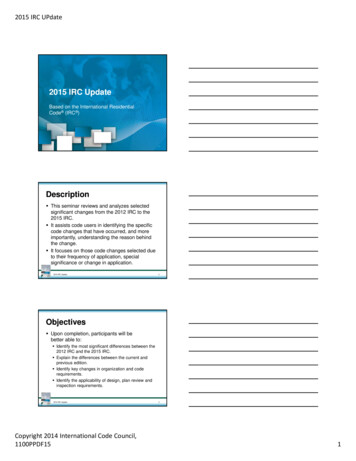
![(New) 2015 IRC Essentials [Read-Only]](/img/13/2015irc-essentials-highlights.jpg)
